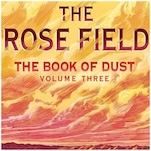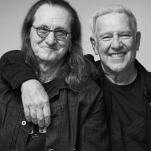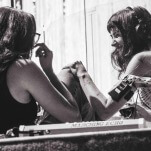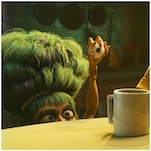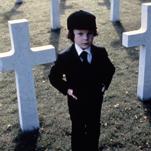Tegan and Sara’s Memoir Is the Queer Coming-of-Age Story I Needed In High School
Photo by Trevor Brady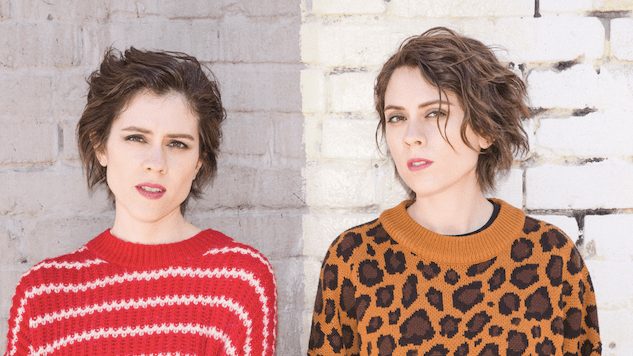
Twin sisters Tegan and Sara Quin have been making music together for over 20 years, trading in their punk-rock roots for synths along the way. They’ve released eight eclectic studio albums, with the ninth, a collection of retooled teenage demos, arriving on September 27. After years of being maligned by the indie music press for their gender, sexuality and defiance of genre conventions, they’ve sold over one million records, ascended to pop stardom and started their own nonprofit fighting for LGBTQ equality. But their new memoir, High School, begins before the two became a musical duo. Told in chapters alternating between Tegan’s and Sara’s perspectives, the book explores their teenage years—complete with messy friendships, sibling rage, alcohol, LSD and divorce—in ‘90s Canada.
It’s the queer coming-of-age story I’ve waited for half my life.
Tegan and Sara turned 26, the age I am now, in 2006—the same year that I turned 13 and discovered them. I know this with certainty because High School’s release prompted me to search for traces of “T&S” in my teenage Gmail, where I discovered an archive of unironically urgent odes to obsession waiting for me. “I cannot stop listening to their music,” I wrote to my best friend over email that year, boasting or maybe pleading for help. “I have all their CDs, I have every unreleased/early/demo track I could get my hands on, they are my wallpaper on my computer, and I pre-ordered their DVD that’s coming out in a bundle with a limited-edition T-shirt despite the $10 shipping.” It wasn’t the first time I had obsessed over a band—and it wouldn’t be the last—but this was different.
As I struggled to keep my queerness quiet, especially from my best friend, who identified as straight at the time and on whom I had a torturous crush, the plaintive laments of “This Is Everything” felt, well, like everything. Tegan and Sara’s world was one in which I was understood, queer angst and all, without having to explain myself. What better way to bridge the gap between reality and the space I found in their songs than accumulating all the relevant objects I could, exorbitant postage (paid for by my dad’s credit card) be damned?
But I didn’t just want to make this unidirectional bond visible across my shelves and on my clothes: I was desperate for a dialogue. I felt like Tegan and Sara knew me. I felt like I knew them. I wanted, more than anything, to give that feeling truth. Had High School come out when I was a teenager, it would have felt nothing less than holy in my hands.
Poring over lyrics, reading every interview, and making sure their image greeted me every time I booted up my computer could only bring me so close to the musicians I idolized. When someone posted photocopies of the introduction Sara had written for Kate Bornstein’s Hello Cruel World: 101 Alternatives to Suicide for Teens on what might as well have been my second home, the unofficial saraandtegan.com message boards, I typed it into Microsoft Word to read again and again. I even emailed the text to my family and friends. As much as I thought I was trying to capture something of my favorite band, I realize now that what I was trying to share with the people around me was myself.
![]()
 Almost every queer woman I’ve met has had a Tegan and Sara moment, if not an entire adolescence—and the Quins know it. Their memoir’s reflective, funhouse-mirror cover is an invitation to discover your own narrative inside. “Hey,” it says, “we’re just like you.”
Almost every queer woman I’ve met has had a Tegan and Sara moment, if not an entire adolescence—and the Quins know it. Their memoir’s reflective, funhouse-mirror cover is an invitation to discover your own narrative inside. “Hey,” it says, “we’re just like you.”
Lifting High School to my face, I remember how I would spend long stretches staring into the mirror as a child, confused and unconvinced that I existed. My queerness only intensified my persistent sense of unbeing. By the time Tegan and Sara reached me, I had heard the words “gay,” “lesbian” and “bisexual”; I knew their meanings. What I couldn’t quite accept was that they described me.
Hunting through my old emails, I find myself desperately pining for my best friend during a summer break she spent continents away. “I MISS YOU. I miss hearing you sing. I miss interrupting your movies. I miss talking to you, knowing that you would understand,” I wrote to her in 2006. “I miss just seeing you.” Tegan and Sara gave me the words I still couldn’t bring myself to say. “So many songs remind me of you,” I wrote. “I don’t know why,” I continued, covering my tracks. “Would you stay home and keep our memories warm with me?” I quoted, from “I Won’t Be Left.” “We’re in this together,” I pulled from “Want to Be Bad,” insinuating the impossible. “I don’t care how far we go.”
Emboldened by my heroes, I finally told her that I was bisexual when she returned home (though I neglected to share the daydreams about her that drove me to despair in my LiveJournal). Even as a scalding fear rose in my chest, something about our mutual love of T&S told me that she would understand. I was right, but my triumph over self-hatred was short-lived. A few days later, I awkwardly confessed to my dad that I “wasn’t normal,” unable, this time, to use the word I knew was mine. I liked boys, I told him—trying to get the good news out first—and liked girls, too. It was a phase, he insisted, reassuring himself and not me. He was a scientist, and the science was on his side. All the studies, he said, showed attraction had nothing to do with it. Any appreciation I had for other girls was purely aesthetic, just part of any woman’s wiring. “I wish I hadn’t said anything,” I sobbed. “You have years to figure it out,” he said. “You can love whoever you want.” This meant nothing. I crawled into bed and listened to Tegan and Sara’s “Buried Alive.”
My dad suffered from selective amnesia for months afterward, persisting in aggressive inquiries over “why I was always reading all those gay books.” I continued to take refuge in Tegan and Sara’s songs, where queerness was always a nonissue and never hidden. Listening to them, I knew who I was, and that couldn’t be taken away from me.
High School abounds with moments in which I’m reunited with my teenage self. As Sara and Tegan struggle to keep their relationships a secret, I remember my first girlfriend refusing to hold my hand on the street or to kiss me in her manga-stuffed bedroom, afraid her parents might discover us. My dad, I was grateful, had come around, even if his undercurrent of discomfort didn’t completely wane.
I rang in high school in 2007 with the duo’s fifth studio album, The Con, weeping over my keyboard on release day as I raced to share my impressions on saraandtegan.com. When I reached “Nineteen,” there was one line that made me sob harder. “I feel you in my heart,” Tegan sings, “and I don’t even know you.” It was my gratitude that made me cry. “That’s exactly how I feel about T&S,” I posted on the forum, and I found that I wasn’t alone.
There are still times when I feel like an apparition, waiting for something or someone to reflect myself back at me better than the mirror can. Tegan and Sara have never been just like me, as the name of their new album releasing Friday asserts. But the fact that High School isn’t a straightforward, triumphant journey makes them very much like me. The twins struggle to name and own their sexualities, unsuccessfully dating guys and drunkenly hooking up and falling in love with girls under a shroud of denial and shame. “My own language was still developing,” writes Tegan, and neither she nor Sara are confidently out by High School’s end, not even to each other. At 17, Sara admits to her mother that she has a girlfriend, but her confession is half-hearted and defensive. Even her liberal, Melissa Etheridge-loving mother is conflicted at first. Before she became her daughters’ most fervent supporter, she felt betrayed. My dad also made strides, but he passed away before he could see and accept me exactly as I was.
“[Coming out] was a very complicated process and it’s not a process I even think is over,” Sara says in an interview with them. “Sometimes homophobia feels like this virus laying dormant. You can be a proud queer person out for over 20 years and every so often, the virus flares up.” My coming out has had its own stops and starts. Sometimes, my breath catches; I hesitate, with the guilty sense that I am subjecting the listener to something.
Tegan and Sara didn’t give me all the answers, but they did bring a piece of me into the light when I needed it most. As I write about their impact on my journey towards accepting my own queerness, however, I wonder if I’m contributing to the “lesbian identical twins from Canada” rhetoric I’ve resented ever since I was a teen. “It’s never about the music!” I raged in a Gchat circa 2007. For fans like me, it has always been about the music: from the earnest earworms of their scratchiest demos to the existential, experimental The Con; from the punchy swagger of This Business of Art to the polished power-pop of So Jealous; from the shimmering, serrated Sainthood and beyond.
But, like High School, it’s also always been about more.
Amanda Gersten is a writer from New York, NY. She probably loves Tegan and Sara more than you.
